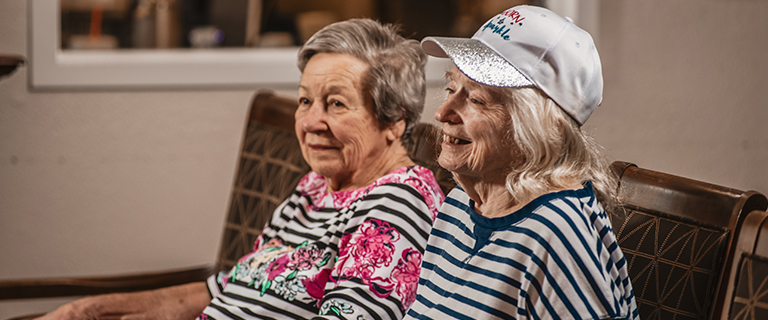Key Takeaways
- Mobility challenges like unsteadiness or fatigue may indicate a need for more support.
- Changes in hygiene habits can reflect difficulty with personal care routines. Also, a decline in daily task management may signal the need for help.
- Missed or duplicated medications show potential concerns with medication management.
- Avoiding social interaction could mean that isolation is impacting emotional well-being.
- Home safety concerns like falls, poor lighting, or clutter can become hazards over time.
How to Tell if It’s Time for Assisted Living
Age is rewarding, but sometimes, it leads to new changes in a person’s daily life. This is entirely natural, but how can you tell if it’s time for a more supportive living situation? It’s all about recognizing new changes in their routines, health, or comfort at home.
6 signs it might be time to consider assisted living include:
- Physical health changes
- Personal care and hygiene challenges
- Daily task management
- Medication management concerns
- Social isolation and withdrawal
- Safety concerns at home
1. Physical Health Changes
As we age, our bodies go through natural changes that can affect how we move, balance, and stay active. These changes can increase fall risks and limit their ability to navigate their home safely. So, watch out for common signs of physical changes, such as:
- Holding onto walls or furniture for balance
- Avoiding stairs or uneven surfaces
- Taking longer to stand up from chairs or the bed
- Walking more slowly or with noticeable stiffness
- Showing visible fatigue after simple tasks
Even subtle shifts like these can make everyday life feel more difficult. This is why assisted living offers safe walking areas, grab bars, and assistance when needed without taking away personal autonomy.
2. Personal Care and Hygiene Challenges
Changes in hygiene or grooming habits are often one of the first signs that extra support may be needed. These shifts are rarely about motivation—instead, they reflect real challenges with mobility, memory, or daily routines.
Your loved one may struggle with personal care if they are often:
- Wearing the same clothes several days in a row
- Skipping baths or showers
- Unkempt hair or noticeable body odor
- Avoiding social activities they once enjoyed
In assisted living, team members are there to help with dressing, bathing, and grooming while honoring each resident’s routines and preferences. This kind of thoughtful support helps people stay comfortable, clean, and cared for without added stress.
3. Daily Task Management
When routine responsibilities start to feel overwhelming, it’s often a sign that someone could use more day-to-day support. Even once-simple chores like cleaning or paying bills can become draining over time.
- Laundry sitting unwashed for days
- Dishes piling up in the sink or around the home
- Mail and bills left unopened or unattended
- A general decline in tidiness or upkeep
In a supportive setting, services like housekeeping, laundry, and maintenance take those daily burdens off residents’ plates. With fewer responsibilities to manage, they have more time and energy to focus on the parts of life they enjoy most.
4. Medication Management Concerns
Managing multiple prescriptions each day can become overwhelming, especially if memory or focus begins to slip. Missed doses or accidental double-ups aren’t just mistakes—they can have serious health consequences.
You can recognize changes in medication management by:
- Missed or skipped doses
- Confusion about what each pill is for
- Taking the same medication twice
- Unopened refills or expired medications
This is why medication management is so important in senior living. Communities help with medication reminders, schedules, administration, and organization. This kind of steady support helps residents stay on track with their health while removing the stress of managing it alone.

5. Social Isolation and Withdrawal
It’s not always obvious when someone starts to feel disconnected. However, small changes in routine and behavior often tell the story. Limited transportation, shifting friendships, or declining health can gradually reduce how often someone socializes. Without proper intervention, isolation can lead to long-term health problems.
Some common signs of social withdrawal include:
- Avoiding or canceling plans more frequently
- Losing interest in hobbies, clubs, or group activities
- Spending long stretches of time alone
- Expressing feelings of loneliness or restlessness
When regular social interaction fades, it can affect more than just mood. A supportive community setting can help rebuild those connections and restore your loved one’s quality of life.
6. Safety Concerns at Home
A home that once felt comfortable can slowly become more challenging to navigate as mobility and balance change. Everyday features—like steps, area rugs, or dim lighting—may turn into hidden hazards.
So, during a visit, make sure you watch for things such as:
- Stumbles, near-falls, or unexplained bruises
- Cluttered hallways or furniture used for balance
- Poor lighting in frequently used spaces
- Difficulty getting in and out of the bathtub or shower
Even small adjustments can make a big difference, but some situations call for extra help. Assisted living communities offer a range of safety features like grab bars and emergency response systems to keep residents safe every day.
Taking the Next Steps Toward Senior Care
At Parsons House La Porte, we understand that this decision involves your whole family’s well-being and your loved one’s happiness. We’ve spent decades helping families navigate this stage, and we’re ready to step in and help you. In our community, residents enjoy the freedom to live on their own terms, with just the right amount of help when they need it.
Whether it’s a friendly conversation over lunch, a favorite hobby brought back into focus, or a little extra support with daily routines, we serve our elders by creating space for connection, independence, and comfort. Your loved one deserves a life of love and support, and we’re here to help. Schedule a tour with us today to discover how Parsons House La Porte supports every resident—one meaningful day at a time.



